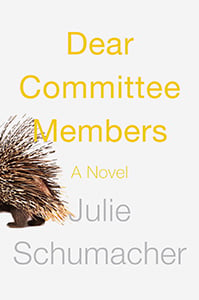An academic treatise on passive-aggression
A review of ‘Dear Committee Members’, a hysterical novel about a beaten-down English prof at a second-tier U.S. university
(Shutterstock)
Share

Julie Schumacher
The author, a novelist and professor of creative writing at the University of Minnesota, recently wrote that in a typical year she receives more than 1,600 letters of recommendation and writes another 50 to 100 LORs herself. So it’s not surprising that Schumacher’s assault on the beleaguered state of the humanities in higher education—expressed through the caustic yet sincere LORs of a beaten-down English prof at a second-tier U.S. university—takes the oldest form of long fiction, the epistolary novel. Or that early readers have found it irresistible to cast their reviews in the form (genuinely laudatory) of a such a letter.
And why not? Dear Committee Members is bitingly funny, right down to the acknowledgments, in which Schumacher thanks her husband, “the world’s most enthusiastic and supportive spouse,” who read the first draft and remarked, “I’m glad we have different last names.” It represents a noble if hopeless rearguard action against the contemporary online evaluation/recommendation mechanism and its ingrained contempt for nuance and individuality. It even increases your vocabulary: Jay Fitger deplores the “teratological” tastes of his students, whose stories feature werewolves, vampires, “exsanguination in graveyards,” sex between gargoyles and humans and, in one comic case, a cannibal couple trapped after a cave-in.
Yet onward Fitger toils, cheerfully sending florid dispatches recommending—often with the back of his hand—his less-gifted students for suitable careers at fast-food establishments and IT firms, while rising to high dudgeon and a kind of poignant eloquence for those in whom he sees promise. One had worked hard at her literary studies, honing “crucial traits: imagination, patience, resourcefulness and empathy,” that made her a fit applicant for a job at Annie’s Nannies Child and Play Centre.
Over 100 letters, Fitger reveals the detritus of his life: the asbestos and other toxins floating about the dilapidated English department, flotsam from the palatial new quarters being constructed on the floors above to house the economics department; his utter hopelessness at office politics (the struggle’s so vicious because the stakes are so small); his willingness to prostrate himself before his ex-wife at the law school and his ex-lover in admin—well aware he has wronged them—for the sake of his students. This brief (180 pages) book manages to be a slashing satire, a master-level class in passive-aggressive tactics and as sweetly hopeful as an academic novel can manage: highly recommended.
